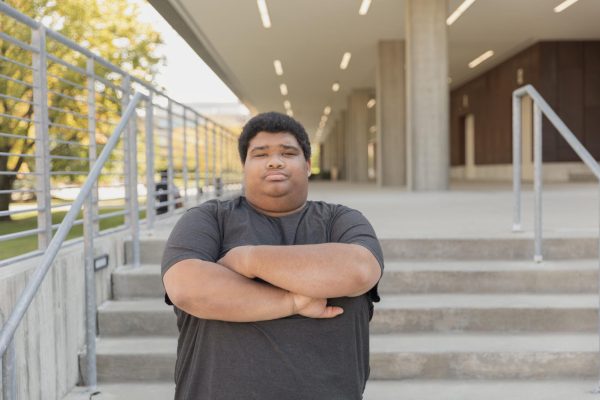Letter to the editor: Lowballing Faculty Diversity
Photo courtesy of Joanne Lipson Freed
Oakland University Assistant Professor of English Joanne Lipson Freed.
Oakland University likes to trumpet its commitment to diversity, equity, and inclusion (or DEI for short). But the administration’s position in the current faculty contract negotiation belies that commitment. The administration’s proposed contract clearly sends the message: “We want to increase diversity, but only if we can pay underrepresented faculty less than they are worth.”
Over the last year, I’ve had the privilege of serving as one of two Provost Fellows for Faculty Diversity at OU. In this role, I’ve helped support a range of diversity-related programs and initiatives, and I’ve worked alongside administrative stakeholders who I believe share my commitment to pursuing a more just, equitable, and inclusive university. However, we cannot convey to underrepresented faculty that we value them and will support their professional success while Oakland seeks to systematically erode the compensation and impinge the academic freedom of the faculty as a whole.
Let me briefly enumerate some of the elements of Oakland University’s current contract proposal that will directly harm our ability to recruit and retain a diverse faculty:
- Reduced compensation makes us less competitive with our peer institutions in recruiting and retaining a diverse faculty. Taken together, proposals that eliminate cost-of-living and market adjustments, lower rates of pay for summer teaching, increase healthcare costs, reduce retirement contributions, freeze research and travel funding, and threaten Special Lecturers’ full-time status significantly erode our compensation. Oakland’s regressive economic package means that we will lose talented faculty—including underrepresented faculty—to competing intuitions. OU’s current and prospective faculty are accomplished experts at the forefront of their respective fields; if we think these highly qualified individuals don’t have other options, and will simply settle for jobs at an institution that habitually tries to cut their pay and benefits, we’re kidding ourselves.
- Violations of shared governance and academic freedom make underrepresented faculty even less secure in their positions. An abundance of research shows that women and minority faculty are more vulnerable to bias and more likely to face unfair treatment in the workplace. Decreasing faculty rights regarding layoff and recall would only increase the vulnerability of these faculty. Dictating which courses are offered online would prevent faculty from teaching as they deem most effective based on their professional expertise; once again, it is likely that the negative effects of this would be disproportionately felt by underrepresented and socially marginalized faculty.
- An unsupportive workplace exacerbates the “pipeline problem.” Conversations about diversity in higher education often circle back to the so-called “pipeline problem”: the idea that there is a shortage of minority students in the graduate school “pipeline” that trains future professors. But we cannot expect members of historically marginalized groups to enter and stay in academia at the expense of their financial security and emotional wellbeing. The current bargaining process conveys to faculty that our hard work and continued excellence will not be financially rewarded, and that we are not valued or cared about by our employer. It stands to reason that underrepresented faculty, who are more likely to be affected by the racial wealth gap and/or the devaluing effects of enduring societal prejudice, are even less likely to tolerate such a toxic working environment—they will simply go elsewhere, pursuing careers where they will be respected and valued.
I have been inspired to hear President Pescovitz, Provost Rios-Ellis, and other university leaders affirm the value of diversity, and I am energized to work toward the future vision of Oakland University their statements conjure: one in which all faculty are valued for their essential contributions to the life of the university and in which OU students increasingly see faculty role models who share their diverse identities and backgrounds.
Now, it’s time to see if the administration’s actions match their words, or whether the rhetoric of diversity has only been for show. We’re watching, and we know the difference.
Letters to the editor can be submitted to [email protected].










Steph • Sep 2, 2021 at 12:00 PM
I’ve created a petition that anyone can sign, in solidarity with faculty. The link to sign and share is https://bit.ly/OUAAUPcn
Adolfo Campoy • Aug 31, 2021 at 7:57 AM
Well said, Joanne.
Our commitment to diversity should look at the systemic roots of the problem. Economic inequity remains a key factor. It is impossible to uphold DEI values while maintaining economic inequity.
Brian K. • Aug 30, 2021 at 3:52 PM
Lol says a prof in a dept. with no POC…. They haven’t had a black scholar since I was a student in the early 00s.
Anonymous • Aug 30, 2021 at 3:39 PM
Oh, yeah, the diversity window dressing to have another stratum of extraordinarily well-paid bureaucrats. How much would OU pay for an international employee’s EB-2 (green card) beyond PERM they have to by law? Exactly: jack squat!